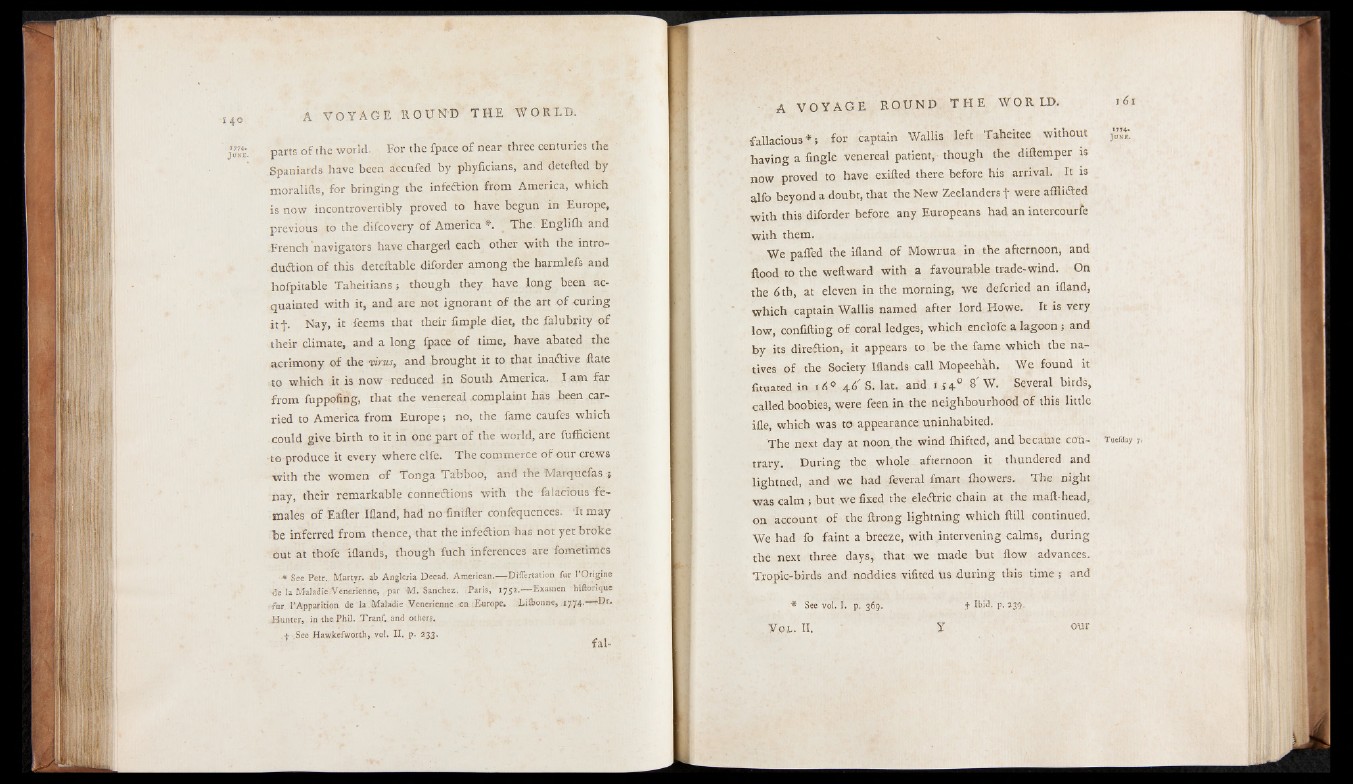
June parts of the world. For the fpace of near three centuries the
.Spaniards have been accufed by phyflcians, and detefted by
moralifts, for bringing the infection from America, which
is now incontrovertibly proved to have begun in Europe,
previous to the difcovery of America*. The Englilh and
French 'navigators have charged each other with the introduction
of this deteftable diforder among the harmlefs and
hofpitable Taheitians; though they have long been acquainted
with it, and are not ignorant of the art of curing
it+. Nay, it feems that their Ample diet, the falubfity of
their climate, and a long fpace of time, have abated the
acrimony of the virus, and brought it to that inactive Hate
to which it is now reduced in South America. I am far
from fuppofing, that the venereal complaint has been carried
to America from Europe; no, the fame caufes which
could give birth to it in one part of the world, are fufficient
to produce it every where elfe. The commerce of our crews
with the women of Tonga Tabboo, and the Marquesas ;
nay, their remarkable connections with the falacious females
of Eafter Ifland, had no Snifter confequences. It may
■ be inferred from thence, that the infection has not yet broke
out at thofe iflands, though fuCh inferences are fometimes
.* See Petr. Martyr, -ab Angleria Decad. American.— .Drflertation fur POrigine
-de la MaiadieVVenerienne, . par 'M. Sanchez. . Paris, 1752.-— Examen hiftorique
rrur PApparition de la Maladie .Venerienne.en ;Europe, .Lifbonne, .17.74.— Dr..
JJunter, in the Phil. Tran/, and others.
+ -See Hawkefwortb, vc 1. II. p. 233.
falfallacious*;
for captain Wallis left Taheitee without
having a Angle venereal patient, though the diftemper is
now proved to have exifted there before his arrival. It is
alfo beyond a doubt, that the New Zeelanders f were afflicted
w ith this diforder before any Europeans had an intercourfe
with them.
We pafled the ifland of Mowrua in the afternoon, and
flood to the weftward with a favourable trade-wind. On
the 6 th, at eleven in the morning, we deferied an ifland,
which captain Wallis named after lord Howe. It is very
low, conflfting of coral ledges, which enclofe a lagoon ; and
by its direction, it appears to be the fame which the natives
of the Society Iflands call Mopeehah. We found it
fituated in 16° 46' S. lat. arid 1 /4.0 8' W. Several birds,
called boobies, were feen in the neighbourhood of this little
ille, which was to appearance uninhabited.
The next day at noon the wind Ihifted, and became contrary.
During the whole afternoon it thundered and
lightned, and we had feveral fmart Ihowers. The night
was calm ; but we Axed the eleCtric chain at the maft-head,
on account of the ftrong lightning which ftill continued.
We had fo faint a breeze, with intervening calms, during
the next three days, that we made but flow advances.
Tropic-birds and noddies vifited us during this time ; and
See vol. I. p. 369. t Jbiu. p. 239,
1774-
June.
T uefday
Vql. II. y our